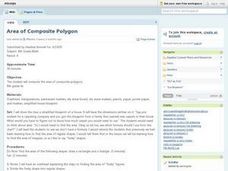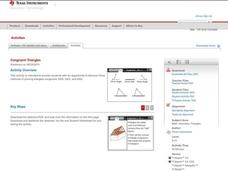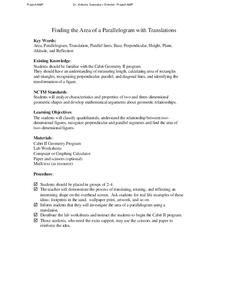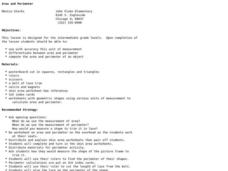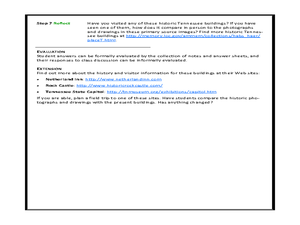Curated OER
Corresponding Parts of Similar Triangles
Here is a lesson that has learners take a look at corresponding parts of similar triangles, ratios of similarity, reductions and enlargements. They'll manipulate the scale factor (r) to observe the changes in similar triangles and then...
Curated OER
Area Formulas
Teach your pupils to calculate the area of different polygons. Learners create formulas to solve their problems. They use the TI navigator to graph their shapes and observe the change in area.
Curated OER
Triangle Explorer
Students calculate the area of triangles using a variety of materials including computer applets.
Curated OER
Finding the Area Under A Curve with Random Probability
Students explore the concept of area under a curve. In this area under a curve lesson, students find the area under a curve using the Monte Carlo method using random points and probability. Students calculate the area under the same...
Curated OER
Area of Rectangles and Triangles
Eighth graders practice calculating the perimeter of different shapes. As a class, they work together to calculate the area of rectangles and triangles using the proper formula. To end the instructional activity, they determine how...
Curated OER
Drawing a Triangle with Cabri Junior
Learners draw triangles on their graphing calculators using the Cabri Junior application. In this graphing calculator lesson, students follow step by step directions to create triangles on their calculator. They identify the type of...
Curated OER
Area of Composite Polygon
Eighth graders are shown a blueprint of a house and must determine the amount of carpet needed. In groups, they calculate the area of rectangles and triangles and apply them to the shapes in the blueprint. To end the instructional...
Curated OER
Area of irregular Polygons: Historical Motivator - Lewis and Clark Adventure
Seventh graders find the area of irregular polygons. In this lesson on calculating area, 7th graders use the adventures of Lewis and Clark as motivation to learn how to calculate the area of irregular polygons.
Curated OER
Roofing and Right Triangles
Students use models and symbols to represent properties of the Pythagorean Theorem. In this right triangle lesson plan, students connect real jobs to properties of right triangles. They solve word problems applying the correct ratios and...
Curated OER
Congruent Triangles
Students identify properties of triangles. For this geometry lesson, students differentiate between similar and congruent triangles. They use the umber of sides to help define the angle of the polygon.
Curated OER
Area of Parallelograms and Triangles
Young scholars explain the formula for finding the area of a paralellogram and its relation to the area of a rectangle. Finally, they construct the formula for the area of a paralellogram.
Curated OER
Perimeter and Area
Seventh graders develop strategies for finding the perimeter and area of large geometric figures. Through lecture and guided practice, 7th graders practice the strategy of dividing a geometric shape into smaller more manageable shapes...
Curated OER
Finding the Area of a Parallelogram with Translations
Students calculate the area of a parallelogram. In this geometry lesson, students perform translation using a coordinate plane and coordinate pairs. They perform translation on other polygons.
Curated OER
Finding the Area of a Parallelogram with Translations
Students calculate the area of parallelograms. In this geometry lesson, students identify properties of parallelograms and use to to solve problems. They create polygons using Cabri software.
Curated OER
Area and Perimeter
Young scholars explore area and perimeter. In this math lesson plan, students differentiate between area and perimeter and compute the area and perimeter of an object.
Curated OER
Surface Area with Polydrons
Students explore measurements by analyzing geometric shapes. In this surface area lesson, students identify the terms volume, weight, perimeter and area in order to find the requested measurements of specific polygons. Students utilize...
Curated OER
Finding the Area & Volume of Buildings Using Architectural Drawings
Fifth graders find the area and volume of buildings. In this architecture instructional activity, 5th graders look at the drawings of three historic Tennessee buildings. They use these to help find the area and volume of the building.
Curated OER
Finding the Area of Triangles
Twelfth graders apply the formula for finding the area of a triangle to various problems. They work real life problems for finding the area of a bathroom and the cost of tiling it. They play a game, Triangle Bingo, where they match...
Curated OER
Similar Triangles
Ninth graders find the height of every day objects using techniques learned through postulates that allow triangles in a problem to be similar. They calculate the length of a missing side and solve proportions.
Curated OER
Length, Perimeter, and Area
Students explore the concepts of length, perimeter and area. Students develop an understanding of length, perimeter, and area. Students calculate the area and perimeter of random shapes and calculate the area and perimeter of a triangle...
Curated OER
The Greedy Triangle
Third graders use the book "The Greedy Triangle" to practice measuring perimeter and area. They also calculate the length of objects.
Curated OER
Volume, Surface Area for Rectangular & Triangular Prisms
Seventh graders explore the concept of rectangular and triangular prisms. In this rectangular and triangular prism lesson, 7th graders identify various prisms as triangular or rectangular. Students discuss the various shapes of bases...
Curated OER
How To Find the Area of a Square And Rectangle
Young scholars practice using the formula to calculate the area of a square or triangle. They participate in large group guided practice using simple area of squares problems then complete a series of problems calculating the area of...
Curated OER
The Sierpinski Triangle
Students investigate the Sierpinski triangle. In this geometry lesson, students define fractal curves and its relationship to triangles. They identify repeating sequences and relate it to fractals.






